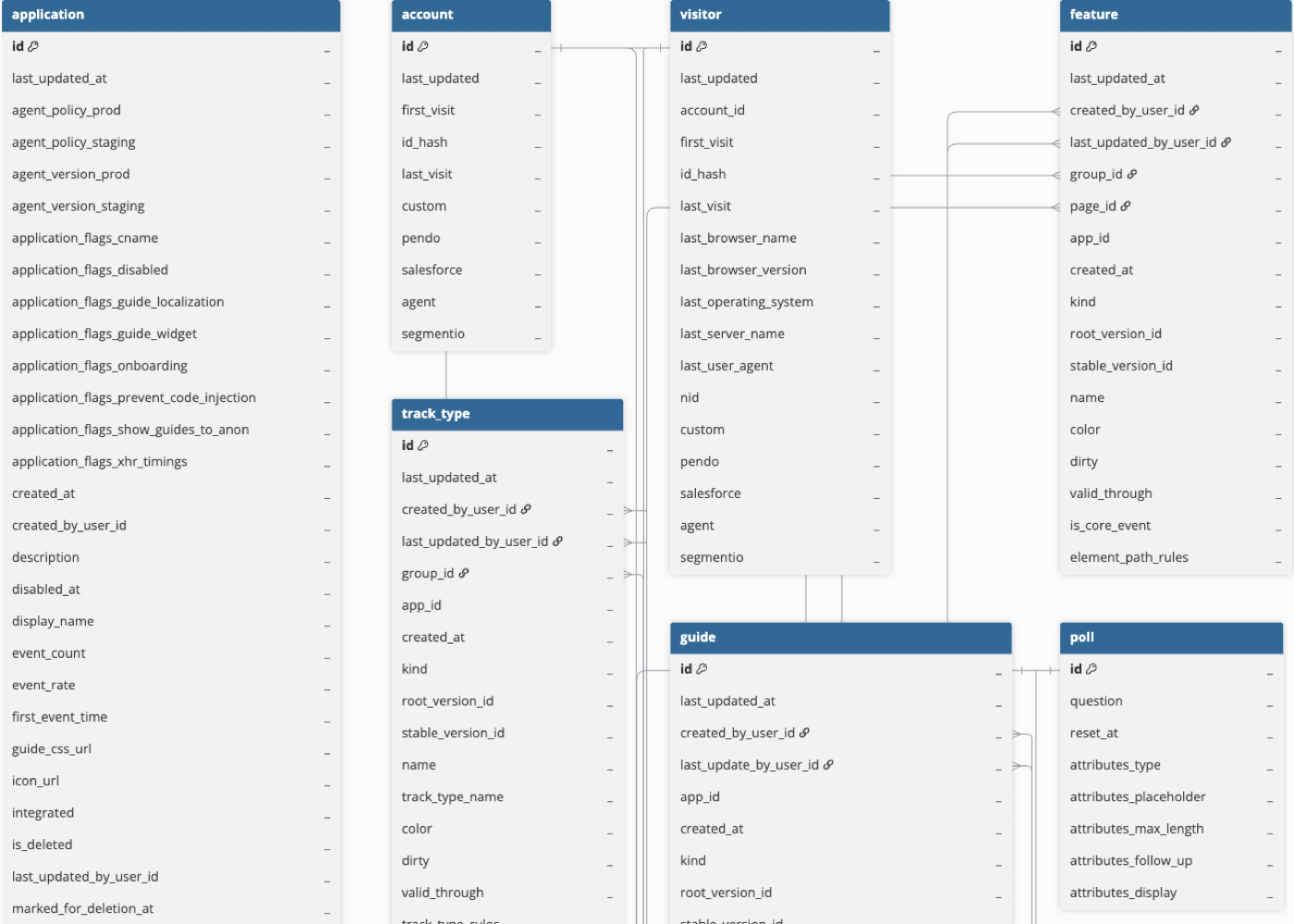Pendo is a software platform that offers product experience and digital adoption solutions to product-led organizations. These solutions help product teams and application owners understand the customer’s product journey, guide users through in-app messaging, and collect feedback to deliver better product experiences.
Pendo allows creating accounts for your subscription only in the US or the EU region. Your data is stored in a regional data center, and Pendo does not allow migrating data between subscriptions or regions. Read Subscription Change Limitations.
Hevo uses the Pendo v1 API endpoints to replicate your data into the desired Destination database or data warehouse. For this, you must provide Hevo with an integration key to access your account’s data. Refer to the Data Model section for information on the objects that Hevo creates in your Destination.
Prerequisites
Generating the Integration Key
You require an integration key to authenticate Hevo on your Pendo account.
Note: You must log in as an Admin user to perform these steps.
Perform the following steps to generate the integration key:
-
Log in to your Pendo account as an Admin user. Use one of the following URLs:
-
In the left navigation pane, click the Settings (  ) icon, and click Integrations.
) icon, and click Integrations.
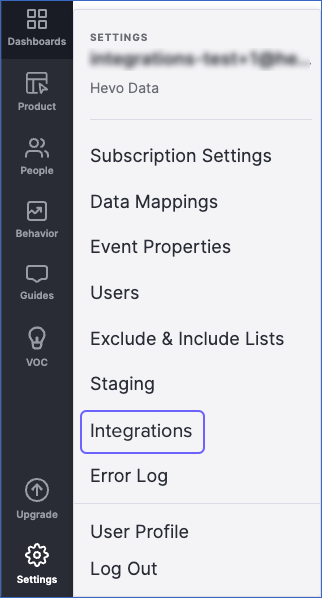
-
On the Integrations page, select the Integrations Keys tab, and click + Add Integration Key.
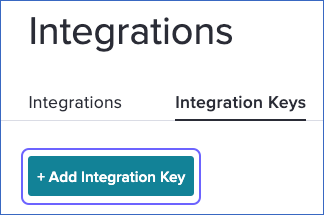
-
In the Add New Integration Key dialog box, do the following:
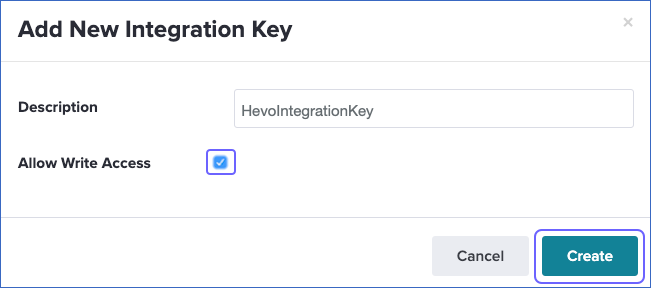
-
In the Description box, describe the key to help you identify it. For example HevoIntegrationKey.
-
Select the Allow Write Access check box to grant read-write access to your integration key.
-
Click Create.
-
Copy the integration key and save it securely like any other password. Use this key while configuring your Hevo Pipeline.

Configuring Pendo as a Source
Perform the following steps to configure Pendo as the Source in your Pipeline:
-
Click PIPELINES in the Navigation Bar.
-
Click + Create Pipeline in the Pipelines List View.
-
On the Select Source Type page, select Pendo.
-
On the Select Destination Type page, select the type of Destination you want to use.
-
On the Configure your Pendo Source page, specify the following:
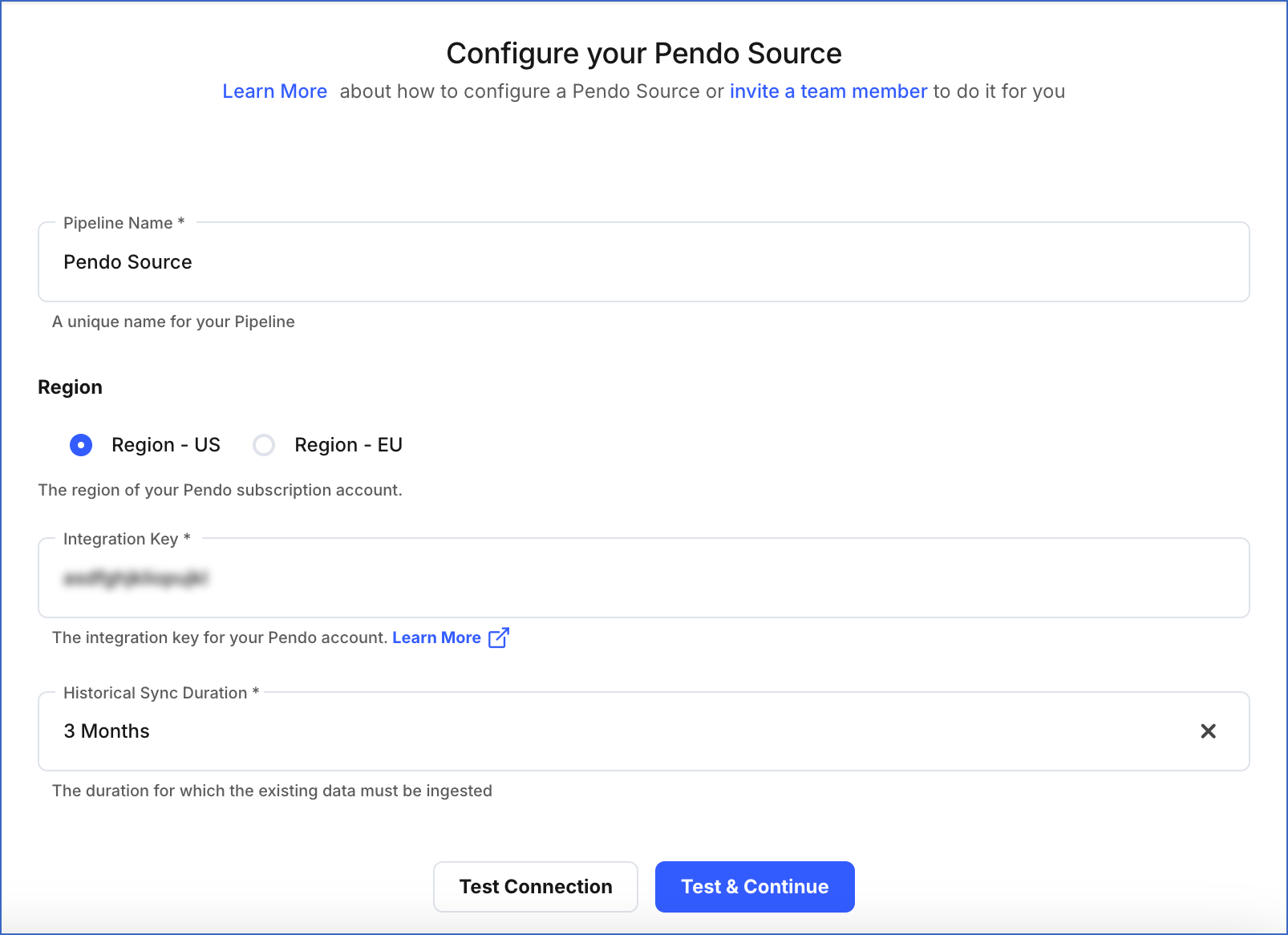
-
Pipeline Name: A unique name for your Pipeline, not exceeding 255 characters.
-
Region: The subscription region of your Pendo account. Default value: Region - US.
-
Integration Key: A secret value with read-write access to your Pendo data via v1 APIs.
Note: This key is specific to the subscription region of your account.
-
Historical Sync Duration: The duration for which you want to ingest the existing data from the Source. Default duration: 3 Months.
Note: If you select All Available Data, Hevo ingests all the data available in your Pendo account since January 01, 2013.
-
Click Test & Continue.
-
Proceed to configuring the data ingestion and setting up the Destination.
Data Replication
| For Teams Created |
Default Ingestion Frequency |
Minimum Ingestion Frequency |
Maximum Ingestion Frequency |
Custom Frequency Range (in Hrs) |
| Before Release 2.21 |
15 Mins |
5 Mins |
12 Hrs |
1-12 |
| After Release 2.21 |
6 Hrs |
30 Mins |
24 Hrs |
1-24 |
Note: The custom frequency must be set in hours as an integer value. For example, 1, 2, or 3, but not 1.5 or 1.75.
-
Historical Data: In the first run of the Pipeline, Hevo ingests the historical data for all the objects using the Recent Data First approach. The data is ingested on the basis of the historical sync duration selected at the time of creating the Pipeline and loaded to the Destination. Default duration: 3 Months.
-
Incremental Data: Once the historical load is complete, data is ingested as per the ingestion frequency in Full Load or Incremental mode, as applicable.
Schema and Primary Keys
Hevo uses the following schema to upload the records in the Destination. For a detailed view of the objects, fields, and relationships, click the ERD.
Data Model
The following is the list of tables (objects) that are created at the Destination when you run the Pipeline:
| Object |
Description |
| Account |
Contains information about the accounts that are associated with a user. In Pendo, accounts are a collection of your product’s users. |
| Application |
Contains information about the applications integrated with your user’s account. |
| Events |
Contains information about the events that Pendo automatically tracks from your browser interactions. |
| Feature |
Contains information about the features your users interact with while using your product. |
| Feature Events |
Contains information about events matched to features marked for tracking by your users. |
| Guide |
Contains information about the in-app messages you show your users to inform them about new features and feature upgrades, walk them step-by-step through tasks, and so on. |
| Guide Events |
Contains information about the interactions your users have with the guides you created. |
| Page |
Contains information about the pages your users visit when using your product. |
| Page Events |
Contains information about events matched to pages marked for tracking by your users. |
| Poll Events |
Contains information on all the interactions your users have with any polls you created. |
| Track Events |
Contains information about the events you create to track user actions, such as creating or deleting a record or logging a specific error case for monitoring purposes. |
| Track Types |
Contains information about the properties that uniquely identify a Track Event while processing it. |
| Visitor |
Contains information about your product’s users, which includes internal customers. |
Read the detailed Hevo documentation for the following related topics:
Source Considerations
- Pendo imposes a strict limit of 100 calls per second to any single API endpoint. Therefore, data ingestion is deferred for a second if the number of calls made by Hevo to any single API exceeds 100.
Limitations
- Hevo does not load data from a column into the Destination table if its size exceeds 16 MB, and skips the Event if it exceeds 40 MB. If the Event contains a column larger than 16 MB, Hevo attempts to load the Event after dropping that column’s data. However, if the Event size still exceeds 40 MB, then the Event is also dropped. As a result, you may see discrepancies between your Source and Destination data. To avoid such a scenario, ensure that each Event contains less than 40 MB of data.
See Also
Revision History
Refer to the following table for the list of key updates made to this page:
| Date |
Release |
Description of Change |
| Nov-11-2025 |
NA |
Updated the document as per the latest Hevo UI. |
| Sep-18-2025 |
NA |
Updated section, Configuring Pendo as a Source as per the latest UI. |
| Jul-07-2025 |
NA |
Updated the Limitations section to inform about the max record and column size in an Event. |
| Jan-07-2025 |
NA |
Added a limitation about Event size. |
| Mar-05-2024 |
2.21 |
Updated the ingestion frequency table in the Data Replication section. |
| Sep-05-2022 |
NA |
Updated section, Data Replication to reorganize the content for better understanding and coherence. |
| May-24-2022 |
1.89 |
New document. |





